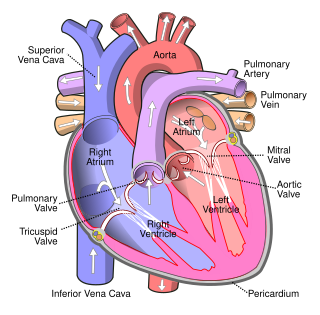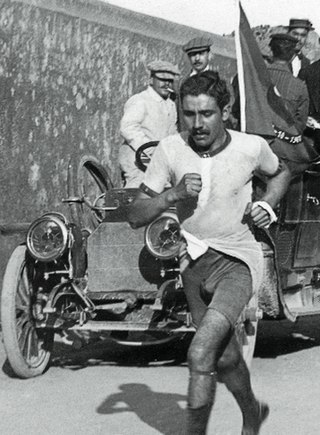
Below is a sortable list of individuals who died as a result of running a marathon.

Below is a sortable list of individuals who died as a result of running a marathon.
The most frequent causes are:
The age distribution ranges widely, from the teens through the sixties.
In 2016, a systematic medical review found that the risk of sudden cardiac death during or immediately after a marathon was between 0.6 and 1.9 deaths per 100,000 participants, varying across the specific studies and the methods used, and not controlling for age or gender. This translates to a few published marathon deaths worldwide in a typical year, although the authors lamented the lack of a central registry for the information. [1]
The second major risk arises from imbalanced fluid or electrolyte levels, particularly hyponatremia (sodium deficiency, overhydration, or water intoxication). As a marathon medical director described the counter-intuitive and under-publicized risk in 2005: "There are no reported cases of dehydration causing death in the history of world running, but there are plenty of cases of people dying of hyponatremia." [2]
Heat stroke is an emergency condition in which thermoregulation fails and the body temperature rises above 104 °F (40 °C). It becomes a greater risk in warm and humid weather. [3]
| Origin | Name [ref.] | Age | Marathon date | Event | Location | Cause / Notes |
|---|---|---|---|---|---|---|
| Francisco Lázaro [4] | 24 | 15 July 1912 | Olympic Marathon | Stockholm, Sweden | Electrolyte imbalance | |
| Jakob Jutz [5] | 35-36 | 26 August 1951 | Swiss Athletics Federation Marathon Championships | Cham, Switzerland | Heart failure | |
| Jacques Bussereau [6] | 48 | 28 October 1984 | New York City Marathon | New York City, US | Heart attack | |
| Duncan Kerr [7] | 28 | 22 September 1985 | Glasgow Marathon | Glasgow, UK | Pneumonia | |
| Martin A. Wurst, Jr. [8] | 32 | 2 November 1986 | Marine Corps Marathon | Washington, D.C., US | Coronary artery disease | |
| Edwin Brown [9] | 47 | 14 December 1986 | Dallas Marathon | Dallas, US | Heart attack | |
| Thomas Becker [10] | 40 | 8 October 1989 | Twin Cities Marathon | Minneapolis, US | Heart attack | |
| William McKinney [11] | 59 | 4 March 1990 | Los Angeles Marathon | Los Angeles, US | Heart attack | |
| Lisa B. Christensen [12] | 19 | 4 November 1990 | Marine Corps Marathon | Washington, D.C., US | Coronary artery abnormality | |
| Julius Becza [13] | 58 | 24 October 1993 | Marine Corps Marathon | Washington, D.C., US | Heart attack | |
| Samuel Grafton [14] | 42 | 16 October 1994 | Detroit Marathon | Detroit, US | Heart attack | |
| Pierre Marguet [15] | 27 | 6 November 1994 | New York City Marathon | New York City, US | Heart attack; also for an unnamed second fatality | |
| Humphrey Siesage [16] | 61 | 15 April 1996 | Boston Marathon | Boston, US | Heart attack | |
| Anna Loyley [17] [18] | 26 | 8 March 1998 | Bath Half Marathon | London, UK | Sudden arrhythmic death syndrome | |
| Kelly Barrett [19] | 43 | 11 October 1998 | Chicago Marathon | Chicago, US | Hyponatremia | |
| Don Scott [20] | 48 | 26 September 1999 | Robin Hood Marathon | Nottingham, UK | Heart attack | |
| Danny Towns [19] | 45 | 22 October 2000 | Chicago Marathon | Chicago, US | Heart attack | |
| Luke Roach [19] | 22 | 7 October 2001 | Chicago Marathon | Chicago, US | Heat stroke | |
| Laura M. Clancy [21] | 29 | 20 October 2001 | Baltimore Marathon | Baltimore, US | Brain aneurysm | |
| Cynthia Lucero [22] | 28 | 15 April 2002 | Boston Marathon | Boston, US | Hyponatremia | |
| Hilary Bellamy [22] | 35 | 27 October 2002 | Marine Corps Marathon | Washington, D.C., US | Hyponatremia | |
| Craig Johanson [20] | 28 | 14 September 2003 | Robin Hood Marathon | Nottingham, UK | Cardiac arrhythmia | |
| Rachael Townsend [23] | 29 | 12 October 2003 | Chicago Marathon | Chicago, US | Mitral valve prolapse | |
| James Leone [11] | 60 | 19 March 2006 | Los Angeles Marathon | Los Angeles, US | Heart attack | |
| Raul Reyna [11] | 53 | 19 March 2006 | Los Angeles Marathon | Los Angeles, US | Heart attack | |
| William Goggins [24] | 43 | 30 July 2006 | San Francisco Marathon | San Francisco, US | Hypertrophic cardiomyopathy | |
| George Spears, Sr. [25] | 49 | 1 October 2006 | Twin Cities Marathon | Minneapolis, US | Heart attack | |
| Earl Seyford [26] | 56 | 29 October 2006 | Marine Corps Marathon | Washington, D.C., US | Heart attack | |
| Marc Witkes [27] | 40 | 10 December 2006 | Tucson Marathon | Tucson, US | Congenital heart abnormalities | |
| David Rogers [28] | 22 | 22 April 2007 | London Marathon | London, UK | Hyponatremia | |
| Chad Schieber [29] | 35 | 7 October 2007 | Chicago Marathon | Chicago, US | Mitral valve prolapse | |
| Ryan Shay [30] | 28 | 3 November 2007 | USA Marathon Championships | New York City, US | Cardiac arrhythmia | |
| Adam Nickel [31] | 27 | 2 March 2008 | Little Rock Marathon | Little Rock, US | Coronary artery abnormality; electrolyte imbalance | |
| Carlos Jose Gomes [32] | 58 | 2 November 2008 | New York City Marathon | New York City, US | Heart attack | |
| Joseph Marotta [32] | 66 | 2 November 2008 | New York City Marathon | New York City, US | Heart attack | |
| Fred Costa [32] | 41 | 2 November 2008 | New York City Marathon | New York City, US | Heart attack | |
| Erin Lahr [33] | 29 | 14 December 2008 | Dallas Marathon | Dallas, US | Cardiac arrhythmia | |
| Colin Dunne [34] | 27 | 1 March 2009 | Barcelona Marathon | Barcelona, Spain | Heart attack | |
| Peter Curtin [35] | 23 | 10 October 2009 | Baltimore Marathon | Baltimore, US | Undetermined, possible heat stroke; body temperature 107 °F (42 °C) | |
| William Caviness | 35 | 9 October 2011 | Chicago Marathon | Chicago, US | Heart attack | |
| Ulysses Thomas [36] | 58 | 5 November 2011 | Savannah Marathon | Savannah, US | ||
| Claire Squires [37] | 30 | 22 April 2012 | London Marathon | London, UK | Heart attack, DMAA supplement | |
| Xavier Jiménez [38] | 45 | 17 March 2013 | Barcelona Marathon | Barcelona, Spain | Heart attack | |
| Sam Harper Brighouse [39] | 23 | 14 April 2013 | Brighton Marathon | Brighton, UK | Ischemic colitis | |
| R. Jacob Zeman [40] | 35 | 9 November 2013 | Rock 'n' Roll Marathon | Savannah, US | "Unsuspected heart condition" | |
| Robert Berry [41] | 42 | 13 April 2014 | London Marathon | London, UK | Heat stroke | |
| Manases Alfon Jr. [42] | 38 | 7 February 2016 | Condura Skyway Marathon | Philippines | ||
| Arnold Lubang [43] | 40 | 7 February 2016 | Condura Skyway Marathon | Philippines | Cardiac arrest | |
| Mike Freeman [44] | 55 | 28 February 2016 | Vodafone Malta Marathon | Sliema, Malta | "Natural causes" | |
| David Seath [45] | 31 | 24 April 2016 | London Marathon | London, UK | Heart attack | |
| Rob Bremer [46] | 50 | 26 November 2017 | Curacao KLM Marathon | Curacao | Cardiac arrest | |
| Matt Campbell [47] | 29 | 22 April 2018 | London Marathon | London, UK | Cardiac arrest | |
| Juan Camilo Arboleda Alzate [48] | 38 | 16 September 2018 | Medellín Marathon | Medellín, Colombia | Heart attack | |
| Claudio Agurto Spencer [49] | 51 | 7 April 2019 | Santiago Marathon | Santiago, Chile | Aortic dissection | |
| Taylor Ceepo [50] | 22 | 19 May 2019 | Cleveland Marathon | Cleveland, US | Cardiac | |
| Harry Vroulis [51] | 74 | 19 January 2020 | Houston Marathon | Houston, US | Heart attack | |
| Gregory McSween | 41 | 9 November 2021 | Marine Corps Marathon | |||
| Bruno Meunier [52] | 41 | 5 June 2022 | Marathon de la Liberté | Caen, France | Heart attack | |
| unnamed [53] | 69 | 3 March 2024 | Tokyo Marathon | Sumida, Tokyo | ||
| Joey Fecci [54] | 26 | 27 April 2024 | Nashville Marathon | Nashville, US | "Natural causes" |
| Country | Event | Deaths | Date |
|---|---|---|---|
| Weliveriya bombing | 15 | 5 April 2008 | |
| Boston Marathon bombing | 3 | 15 April 2013 | |
| Gansu ultramarathon disaster | 21 | 22 May 2021 |

The marathon is a long-distance foot race with a distance of 42.195 km, usually run as a road race, but the distance can be covered on trail routes. The marathon can be completed by running or with a run/walk strategy. There are also wheelchair divisions. More than 800 marathons are held throughout the world each year, with the vast majority of competitors being recreational athletes, as larger marathons can have tens of thousands of participants.

Cardiac arrest, also known as sudden cardiac arrest, is when the heart suddenly and unexpectedly stops beating. As a result, blood cannot properly circulate around the body and there is diminished blood flow to the brain and other organs. When the brain does not receive enough blood, this can cause a person to lose consciousness. Coma and persistent vegetative state may result from cardiac arrest. Cardiac arrest is also identified by a lack of central pulses and abnormal or absent breathing.

Long-distance running, or endurance running, is a form of continuous running over distances of at least 3 km (1.9 mi). Physiologically, it is largely aerobic in nature and requires stamina as well as mental strength.

Brugada syndrome (BrS) is a genetic disorder in which the electrical activity of the heart is abnormal due to channelopathy. It increases the risk of abnormal heart rhythms and sudden cardiac death. Those affected may have episodes of syncope. The abnormal heart rhythms seen in those with Brugada syndrome often occur at rest. They may be triggered by a fever.
Hyponatremia or hyponatraemia is a low concentration of sodium in the blood. It is generally defined as a sodium concentration of less than 135 mmol/L (135 mEq/L), with severe hyponatremia being below 120 mEq/L. Symptoms can be absent, mild or severe. Mild symptoms include a decreased ability to think, headaches, nausea, and poor balance. Severe symptoms include confusion, seizures, and coma; death can ensue.

Long QT syndrome (LQTS) is a condition affecting repolarization (relaxing) of the heart after a heartbeat, giving rise to an abnormally lengthy QT interval. It results in an increased risk of an irregular heartbeat which can result in fainting, drowning, seizures, or sudden death. These episodes can be triggered by exercise or stress. Some rare forms of LQTS are associated with other symptoms and signs including deafness and periods of muscle weakness.

Short QT syndrome (SQT) is a very rare genetic disease of the electrical system of the heart, and is associated with an increased risk of abnormal heart rhythms and sudden cardiac death. The syndrome gets its name from a characteristic feature seen on an electrocardiogram (ECG) – a shortening of the QT interval. It is caused by mutations in genes encoding ion channels that shorten the cardiac action potential, and appears to be inherited in an autosomal dominant pattern. The condition is diagnosed using a 12-lead ECG. Short QT syndrome can be treated using an implantable cardioverter-defibrillator or medications including quinidine. Short QT syndrome was first described in 2000, and the first genetic mutation associated with the condition was identified in 2004.

The Chicago Marathon is a marathon race held every October in Chicago, Illinois. It is one of the six World Marathon Majors. Thus, it is also a World Athletics Label Road Race. The Chicago Marathon is the fourth-largest race by number of finishers worldwide.

Electrolyte imbalance, or water-electrolyte imbalance, is an abnormality in the concentration of electrolytes in the body. Electrolytes play a vital role in maintaining homeostasis in the body. They help to regulate heart and neurological function, fluid balance, oxygen delivery, acid–base balance and much more. Electrolyte imbalances can develop by consuming too little or too much electrolyte as well as excreting too little or too much electrolyte. Examples of electrolytes include calcium, chloride, magnesium, phosphate, potassium, and sodium.

Water intoxication, also known as water poisoning, hyperhydration, overhydration, water toxemia or hyponatremia is a potentially fatal disturbance in brain functions that can result when the normal balance of electrolytes in the body is pushed outside safe limits by excessive water intake.

Athletic heart syndrome (AHS) is a non-pathological condition commonly seen in sports medicine in which the human heart is enlarged, and the resting heart rate is lower than normal.
Ryan Shay was an American professional long-distance runner who won several USA championships titles. He was born in Ypsilanti, Michigan, and attended the University of Notre Dame. He was married to Alicia Craig, also an American distance runner.

Francisco Lázaro was a Portuguese Olympic marathon runner and Portugal's standard-bearer in their first-ever participation at the Olympic Games, the 1912 Summer Olympics in Stockholm, Sweden.

It remains a difficult medical challenge to prevent the sudden cardiac death of athletes, typically defined as natural, unexpected death from cardiac arrest within one hour of the onset of collapse symptoms, excluding additional time on mechanical life support. Most causes relate to congenital or acquired cardiovascular disease with no symptoms noted before the fatal event. The prevalence of any single, associated condition is low, probably less than 0.3% of the population in the athletes' age group, and the sensitivity and specificity of common screening tests leave much to be desired. The single most important predictor is fainting or near-fainting during exercise, which should require detailed explanation and investigation. The victims include many well-known names, especially in professional association football, and close relatives are often at risk for similar cardiac problems.
Death can occur during sexual intercourse for a number of reasons, generally because of the physical strain of the activity, or because of unusual extenuating circumstances. There are various euphemisms for death during sex, including "dying in the saddle" or the French "la mort d'amour".
Exercise-associated hyponatremia (EAH) is a fluid-electrolyte disorder caused by a decrease in sodium levels (hyponatremia) during or up to 24 hours after prolonged physical activity. This disorder can develop when marathon runners or endurance event athletes drink more fluid, usually water or sports drinks, than their kidneys can excrete. This excess water can severely dilute the level of sodium in the blood needed for organs, especially the brain, to function properly.

The Mexico City Marathon is an annual road running event over the marathon distance 42.19 kilometres (26.22 mi) which is held on the streets of Mexico City in late August or early September that in 2018 received IAAF Gold Label Status.
Phidippides cardiomyopathy refers to the cardiomyopathic changes that occurs after long periods of endurance training. It was named after Phidippides, the famous Greek runner who died after running from Marathon to Athens in 490 BC.